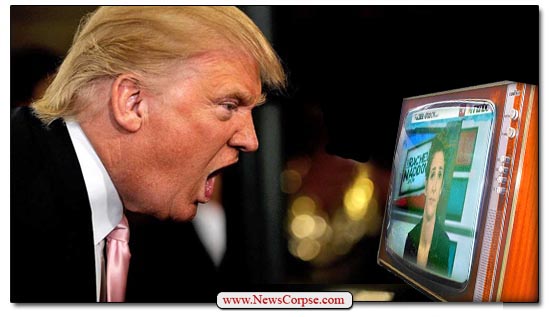In the wake of the bombing mission that Donald Trump ordered allegedly to rid Iran of nuclear weapons capabilities, the media had the audacity to do their job and report on what was known about the mission and its results. That, of course, drove Trump crazy, because the last thing he ever wants is for the truth about his often reckless escapades being exposed to the light of day.
Click here to post this article on Twitter or Click here to post on Bluesky

In Trump World it is never permitted to do or say anything critical of Dear Leader. His every word is to be regarded as if gospel, and every act must be glorified with the enthusiasm of an adoring apostle. That’s evident in the worshipful testimony delivered by his devoted propaganda purveyors.
SEE THIS: Trump Cult Priestess, Karoline Leavitt, Preaches the Divine Infallibility of Dear Leader
On Thursday Trump underwent a severe mental breakdown triggered by the press that he hates and regularly maligns as “the enemy of the people.” In a barrage of rancid posts to his failing Twitter ripoff, Truth Social, Trump unleashed a series of demands that journalists he doesn’t like be fired. He seems to think that he’s still on “The Apprentice” and can axe people from his program at will.
The primary target of Trump’s wrath was CNN’s Pentagon correspondent, Natasha Bertrand. Trump began his harangue by lashing out at her on Wednesday saying that…
“Natasha Bertrand should be FIRED from CNN! I watched her for three days doing Fake News. She should be IMMEDIATELY reprimanded, and then thrown out ‘like a dog.'” [And that] “She lied on the Laptop from Hell Story, and now she lied on the Nuclear Sites Story, attempting to destroy our Patriot Pilots by making them look bad…She should not be allowed to work at Fake News CNN….FIRE NATASHA!”
First of all, does anyone really believe that Trump watched CNN for three days? Setting that aside, Trump’s claim that she lied is…well, a lie. She reported what she was told by Trump’s own Defense Department Intelligence Agency. Trump even later admitted that. Although he complained that the DIA assessment was preliminary. Which Bertrand reported saying that “The analysis of the damage to the sites and the impact of the strikes on Iran’s nuclear ambitions is ongoing, and could change as more intelligence becomes available.”
Trump tried to spin this story as an attack on the pilots who flew the mission to Iran. Which is pure bullpucky. He also dredged up a five year old complaint about Hunter Biden’s laptop, which was also correctly reported by Bertrand. Then on Thursday, Trump continued his tantrum with several posts demanding the termination of many more reporters. He whined that…
“Rumor is that the Failing New York Times and Fake News CNN will be firing the reporters who made up the FAKE stories on the Iran Nuclear sites because they got it so wrong. Lets see what happens?”
And that…
“One of the greatest, most professional, and most ‘confirming’ News Conferences I have ever seen! The Fake News should fire everyone involved in this Witch Hunt, and apologize to our great warriors, and everyone else!”
And that…
“FAKE NEWS REPORTERS FROM CNN & THE NEW YORK TIMES SHOULD BE FIRED, IMMEDIATELY!!! BAD PEOPLE WITH EVIL INTENTIONS!!!”
And in a major escalation of his insanity, with zero evidence, Trump fumed that…
“The Democrats are the ones who leaked the information on the PERFECT FLIGHT to the Nuclear Sites in Iran. They should be prosecuted!“
Former Fox News host Pete Hegseth, who is currently playacting as Trump’s Secretary of Defense, held a press scolding Thursday morning, wherein he whined about the media in a manner that would embarrass an eight year old. During that reality TV-style melodrama, Hegseth chastised his former Fox News colleague, Jennifer Griffin, who wasn’t havin’ his asininity. And he demonstrated his pitiful lack of historical knowledge of American warfare…
This is a great example of how everything in Trump world dials up the hyperbole to preposterous levels, where whatever Trump does is the BESTEST in the history of humanity!Hegseth apparently never heard of D-Day, or Hiroshima, or Desert Storm, or getting Osama bin Laden.
— News Corpse (@newscorpse.bsky.social) 2025-06-26T17:26:27.476Z
What Trump and his minions are making abundantly clear is that they do not want any credible journalism to be practiced in this country. They regard news reporting as unpatriotic if it isn’t gushing with praise for Trump. But nothing is more patriotic than reporters who speak truth to power.
Unfortunately, Trump’s hatred of the Constitution’s First Amendment is all too apparent in his attempts to get journalists fired when they are less than reverential supplicants to His MAGA-STY. Consequently, this country needs bold journalists now more than ever.
RELATED STORIES:
- The Trump Regime’s Post-Iran Bombing Propaganda Party is a Sputtering Dud
- Scaredy Trump Lashes Out Maniacally at the One Woman on Fox News Who Dares to Defy His MAGA-STY
- As the World Burns: Trump Whines that ‘MAGA HATES Fox News’ After New Poll Shows Him Floundering
Be sure to visit and follow News Corpse
on Twitter and Facebook and Bluesky and Threads.And check out my books on Amazon:
Fox Nation vs. Reality:
The Fox News Cult of Ignorance.Thanks so much for your support.



